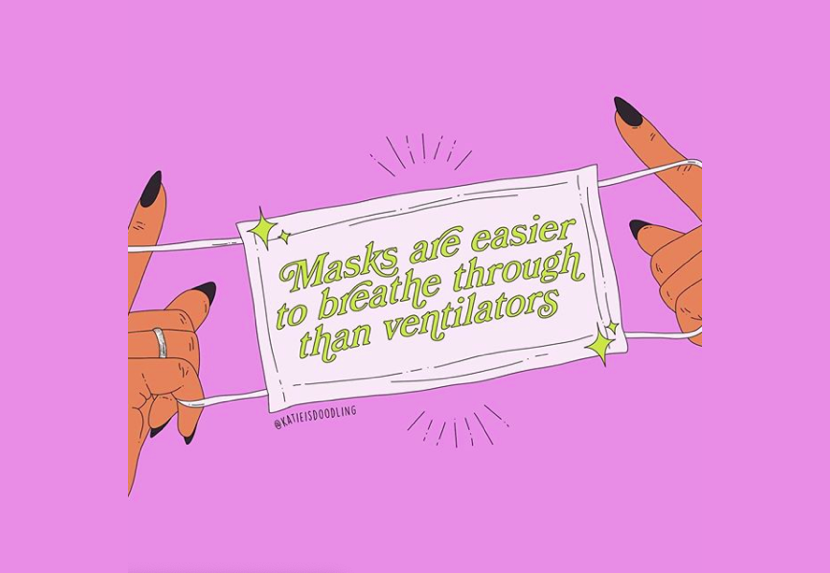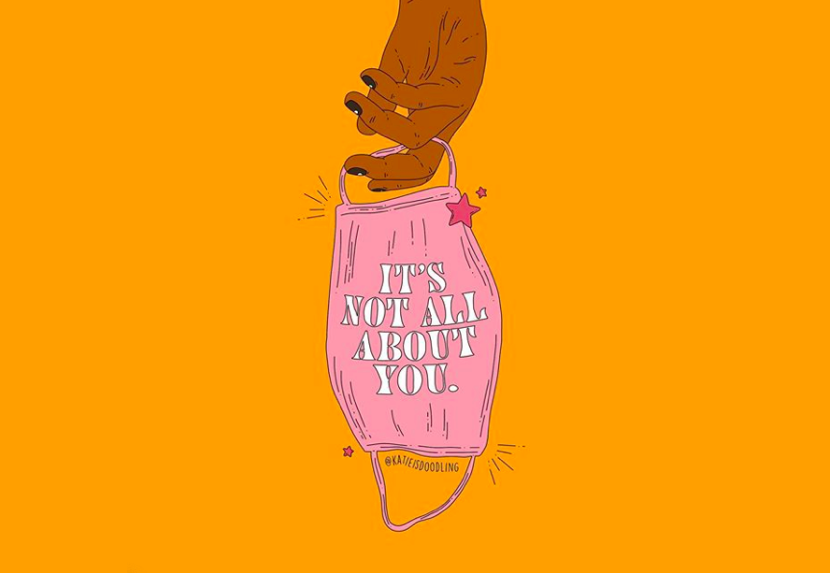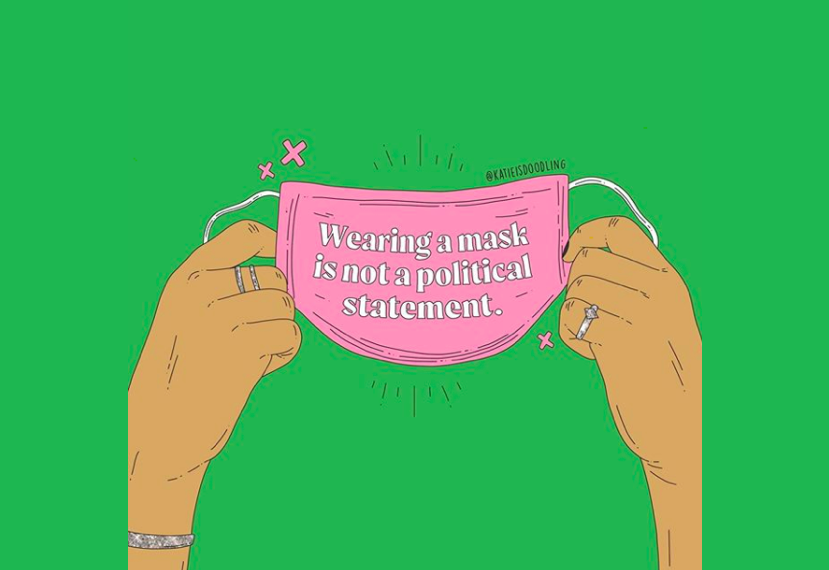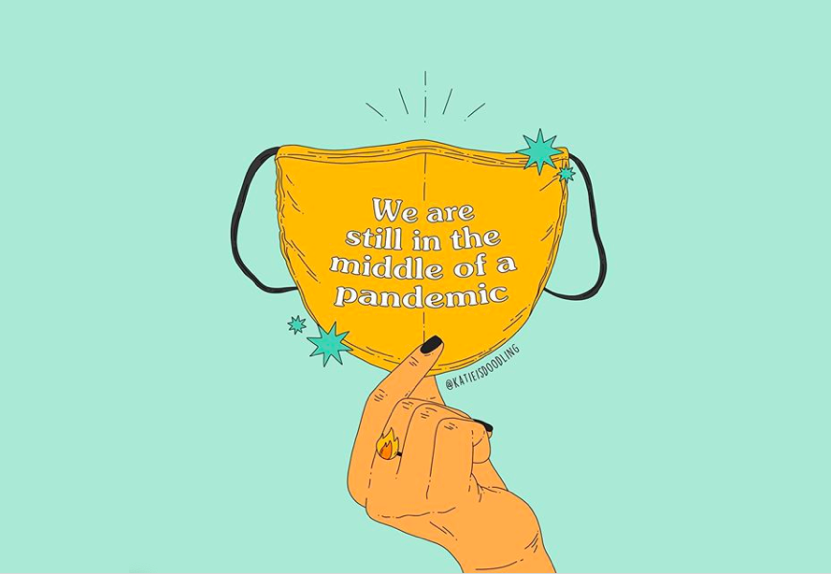MASK UP
Are facemasks during coronavirus part of the problem or the solution?
By Darcey Sergison / 15 August 2020

Illustration by Katie Czerwinski
Since Friday the 24 July it has been mandatory to wear masks in shops, takeaways and train/bus/coach stations across England. This response has been somewhat delayed, with many parts of the world establishing these regulations earlier in the year.
Many of us are experiencing some form of anxiety due at the prospect of adapting to a different way of life; a ‘new normal’. I have found that wearing a mask has provided me with a hint of quiet security and composure when venturing outside. With scientific research proving the importance behind containing the spread of COVID-19 by wearing a mask, it has become glaringly obvious that we must all play our part by following the new guidelines. Although a mask may be uncomfortable, said scientific research puts into perspective how insignificant the discomfort is when compared with risking the lives of ourselves and others by not wearing one. From the start of lockdown, there have been debates surrounding the initially medical requirement to wear a mask, and the impact this has on the transmission of COVID-19. The World Health Organisation, and public health authorities around the world, changed their guidance regarding wearing face masks in June.

Despite the majority, including myself, supporting this new ruling, many others outwardly stand in opposition.
Consequently, there has been a rise in anti-mask protestors during the global lockdown. Most recently, “anti-maskers” have gathered in central London for mass protests against this latest legislation. When interviewed, they claimed that wearing a mask is “ludicrous” and makes no “scientific sense”.
Clare Wills-Harrison, one of the organisers of the protests, said the demonstrators were “campaigning for the return of [their] rights and liberties”. However, in a time when the Black Lives Matter movement has been making global headlines and continues to fight for equal rights and liberties for black people, anti-mask protests are trivial and the protestors involved are irrational. The large gatherings seen around the world have caused some to worry that there will be spikes in COVID-19 case numbers, but organisers of BLM protests have responded by outlining strict social distancing measures and advocating for the use of face masks at protests. In addition, it is important to note that BLM protests are, for black people, a matter of life and death – anti-mask protests, in contrast, display a flagrant disregard for life and death. Caroline Buckee, an associate professor of epidemiology at the Harvard T.H. Chan School of Public Health, has highlighted that there is no evidence to suggest protests, as opposed to the reopening of public facilities, are responsible for increasing case numbers.

In fact, when these protests first began there were concerns that if spikes did occur this would be linked in a racist manner to the protestors marching around cities around the world. It’s important to recognise that when we wear a mask, it is not just for our own safety but for the safety of others in our communities who may be vulnerable. Research has shown that in the UK, people of colour are disproportionately affected by COVID-19, so by wearing a mask, you are not only adhering to the law, but you are also protecting others at risk.
The most worrying aspect of anti-mask protests is the dangerous spreading of misinformation. As seen in the US establishment over the past months, a founding element of the anti-mask movement is the creation of conspiracy theories. One of the key claims is that prolonged use of masks deprives your body of oxygen. An article on a Nigerian news site, originally translated from Spanish, carried the claim back in April and has been shared 100,000 times.
However, doctors are combatting this misinformation. “Thin paper or cloth masks will not lead to hypoxia. Surgeons operate for hours wearing them. They don't get these problems," says Prof Keith Neal, an infectious disease expert. A group of doctors has also decided to run 22 miles while wearing masks to prove to people that claims to the contrary are redundant, even when running. This demonstrates the importance of choosing reliable sources to learn more about the medical validity of new legislations that have arisen from the pandemic. Rather than looking to Instagram or Facebook for updates, make sure you look at medically correct outlets, such as WHO, for clear and accurate advice.

If this legislation is practised around the country and normalised within our society, the benefits will be seen. If everyone follows the government-issued advice regarding wearing masks, the number of cases and deaths from COVID-19 will be reduced and we will succeed in protecting the most vulnerable in society. As the UK follows other countries with the wearing of masks being made compulsory, I hope that more people adhere to this rule without protest. I will continue to wear my face mask for my family, my health and the vulnerable around me in society. I hope you join me in this joint effort, and people continue to share the eye squint hidden smile to others wearing facemask.
Art by
Words by
Share this article

